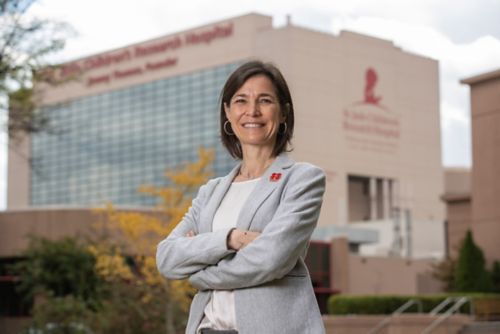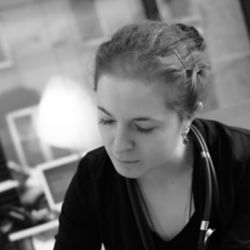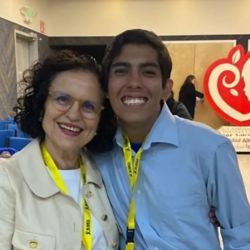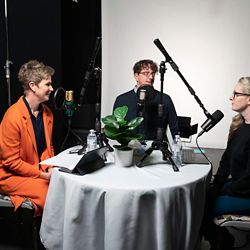Being a warrior is not for everyone. Let’s change the language of cancer.

Alejandra Mendez is the mother of a childhood cancer survivor. She is involved in local and global projects to improve the quality of life of childhood cancer patients, survivors, and their families.
Our son Pablo was 2 years old when, in January 2001, he was diagnosed for the first time with clear cell sarcoma of the kidney. That day, our lives changed forever. My husband and I were young. We had so many beautiful plans for our family. But instead, we had to quickly adapt to a life of uncertainty, fear, and anxiety.
At first, I was numb and in total denial. I focused on living one day at a time and trying to cope with my feelings. I was not only facing the possibility of my child dying, but I quickly learned that the only way to save his life was to have him undergo painful, aggressive, and exhausting medical treatment. Every day, I felt more vulnerable, fragile, and angry. I wasn’t brave—I was terrified. I needed to share my dark feelings, my nightmare. I longed for support, comfort, hugs, and tissues as I cried.
But I suddenly found myself labeled a superhero and an inspiration to others. My relatives, friends, and even care team members decided that I would fight the battle as a ninja. I feared that I might disappoint them if I showed my real feelings. Having to show a positive attitude all the time was exhausting.
Superhero or little boy?
I got concerned when Pablo received a superhero costume. If I felt uneasy in my role as a warrior, what message did Pablo receive with that gift? I sensed that some children on the oncology ward struggled with being cast as superheroes.
Their struggle was not surprising. According to child psychologists, children are concrete thinkers until age 7. Their reasoning focuses on immediate experiences and exact interpretations. They might not understand humor, irony, or figurative language. They might not recognize the difference between playing a superhero and the expectation of becoming one.
I worried that messages and gifts meant to support, motivate, and lift the spirits of children with cancer instead suggested that if their courage or positive attitude faltered, they might die as if there was something they could do to prevent cancer growth.
I wondered if the labels people assigned to the children would keep them and their caregivers from talking about the exhaustion, nausea, and other side effects that sometimes made day-to-day life a struggle. I felt like our real emotions were not acknowledged. We all felt tired and frustrated, but we also felt social expectations to be optimistic and inspiring.
A positive attitude is not enough
Pablo’s cancer returned 3 more times. The treatment was grueling. It included chemotherapy, radiation, surgery, and 2 bone marrow transplants. He was often exhausted, nauseated, and dealing with treatment side effects. I could see he lacked the energy or enthusiasm to “fight for his life.” The same was true for me.
Each time the cancer returned, the war metaphors were more difficult for me to hear. Our positive attitude may have helped us cope, but it did not cure my son’s cancer. In our journey, I met extremely positive children who died of cancer despite their optimism and great attitude. Later, I learned that studies show that a positive attitude does not affect a person's chance of survival or disease course.
I am concerned about how the language of battle may affect bereaved parents whose children did not survive. The thought haunts me that an emphasis on being a warrior might inadvertently leave children and families feeling like failures, somehow responsible for their treatment outcome.
"Here is my suggestion. When talking or writing about anyone other than yourself or your children, use clinically accurate and specific terms to describe the illness."
The real warriors
I eventually realized that members of Pablo’s medical team were the ones battling his cancer. The team included scientists in the lab along with doctors and nurses in the clinic.
They needed to defeat the sarcoma by finding a new drug, choosing the right protocol, and providing the best possible care. That was their job. Our job was to cope with our emotions and the effects of Pablo’s disease and treatment. This change of perspective eased my pain and my own demand to always be strong.
"Many of us felt that being labeled as heroes put pressure on us. The title made us feel like we were not allowed to look sick or express negative emotions."
Our choice
This story has a happy ending. Pablo’s medical team won the battle. Pablo is cured. He is a clinical psychologist who works with sick children, helping them cope with their emotions.
I am now totally devoted to supporting children with cancer and their families. I have met hundreds of parents, patients, and survivors and learned that I am not the only one uncomfortable with mixing cancer with war metaphors.
Many of us felt that being labeled as heroes put pressure on us. The title made us feel like we were not allowed to look sick or to express negative emotions. The expectation made it hard for us to be open.
I understand that many children and their parents may feel inspired by talk of superheroes and warriors. There are no right or wrong words for people talking about their own personal experiences. Some may see their cancer experience as a fight or a battle.
Patients and their families should use the words that connect them with the goal of becoming healthy. But please remember that others may feel uncomfortable with the label you choose. There’s no such thing as a ”typical cancer patient.” People have different preferences and experiences.
Changing cancer’s status
Here is my suggestion. When talking or writing about anyone other than yourself or your children, use clinically accurate and specific terms to describe the illness.
Talk less about war and more about disease. Let’s return cancer to its status as a disease and not a war.





